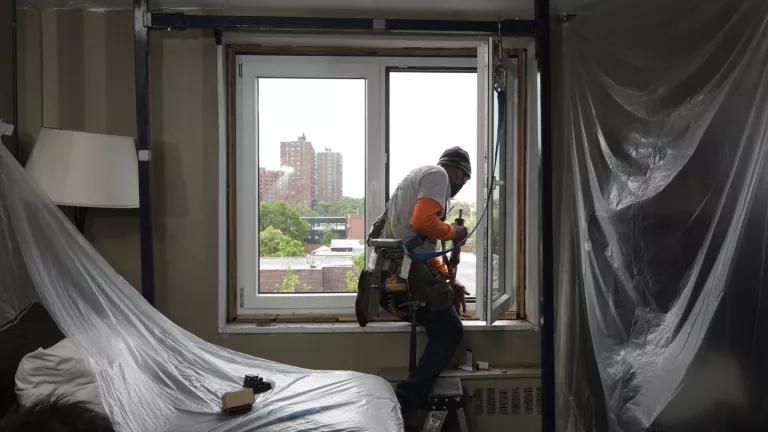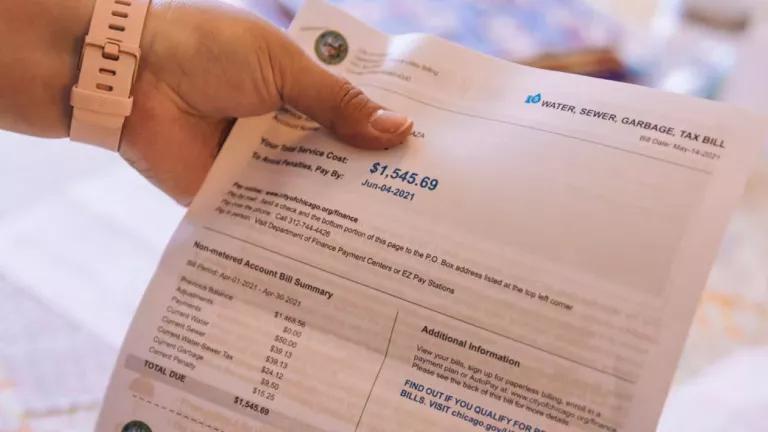Basic Fairness: Access to Water & Sewer Service in Michigan
In this country, in this day and age, it’s shameful that our public water systems often struggle to provide safe, sufficient, affordable, accessible water for the people those systems were built to serve.
A package of bills being introduced in Michigan, rooted in basic values of fairness and good government, offers important reforms to safeguard water access and affordability for all. Many of these reforms provide the same basic protections, for water and sewer service, that people already enjoy for gas and electric service. As a society, shouldn’t we protect affordable access to water, which is literally essential to life, at least as much as we value keeping on the lights and the heat?!
This legislation would, among other things, create strong consumer protections for people receiving public water service. It would ensure transparency of water and sewer utilities’ rate-setting and collections practices, revenues and expenses, and other aspects of utility operations that affect the cost of water service. And it would create a new program—similar to existing programs to help low-income residents afford gas and electric bills—to guarantee affordable water bills for those with the least ability to pay.
Michigan is ground-zero for many of our nation’s water challenges. Though the state is hardly alone, it provides a sobering reality-check on the nature of the problems, and a window on the solutions.
The lead crisis in Flint seared indelibly on our national consciousness the importance, and the precariousness, of safe drinking water. Today, state and local leaders and communities across Michigan continue to grapple with not only with lead, but also a class of toxic chemicals (known as PFAS) that turn out to be more pervasive than most had imagined. Meanwhile, the rising cost of keeping clean water flowing to homes—and of spiriting away sewage for proper treatment—has for years bred another water crisis, which is all too familiar to many of Michigan’s most vulnerable. A crisis of access and affordability.
In recent years, Detroit has become notorious for shutting off water to over 100,000 low-income customers who could not afford their water bills. The UN called these shutoffs a violation of human rights. Flint reportedly had among the highest rates in the country even as it delivered toxic water to its residents, and the city’s consultants warned last year that rates could keep rising another 50% over the next three years. A recent study from the University of Michigan found that, across the entire tri-county region of Southeast Michigan, low-income residents struggle to pay water and sewer bills that often amount to 10% of their household income—forcing them to choose between risking shutoff or forgoing other basic necessities to make ends meet. Activists in Detroit, like members of the People’s Water Board, literally take to the streets demanding solutions.
When people are unable to pay their water and sewer bills, they face not only shutoffs but also liens on their homes, which can lead to loss of access to housing, serious adverse health consequences, and even loss of custody of children. Public health data suggest that widespread shutoffs in Detroit are linked to the spread of infectious disease. For some, “surviving without running water has become a way of life,” as one recent news article put it.
This is not a situation we should tolerate in America—or anywhere.
Here in the United States, Michigan is not alone in facing these water affordability challenges. The country needs massively increased federal, state, and local funding to cover the costs of repairing, replacing, and upgrading our aging and inadequate water, wastewater, and stormwater infrastructure. Because utility customers are the primary source of dedicated funding for systems, water costs—which have been increasing at about three times the rate of inflation over the last decade—will continue to increase. At the same time, real growth in income has been relatively stagnant and income inequality has increased. Water and sewer costs impose a growing financial burden, as a share of household income, for many lower-income people all around the country.
While we can’t solve these problems without more infrastructure funding, this isn’t just about more total dollars. And no single solution or level of government can solve this alone. Fundamentally, We need a suite of solutions—at the federal, state, and local levels—to ensure that clean water is accessible to everyone at prices they can afford.
But so long as people struggle to pay their water bills—when water costs, relative to household income, pose an undue burden on many households—there’s a need for basic consumer protections to ensure that inability to pay does not result in lack of access.
Shockingly, Michigan law provides essentially no consumer protections for water and sewer customers. And the same is true for customers of publicly-owned water and sewer systems in most states.
For example, a 2016 report by the We the People of Detroit Community Research Collaborative illustrated—literally, using this map to visualize the data—that municipal water systems in the Detroit metro area have a wide range of shutoff policies, with some of them more forgiving than others of customers who struggle to pay. A recent report on the frequency of shutoffs in large water systems around the country found that some cities with low water costs but strict shutoff policies experienced a high rate of shutoffs. Meanwhile, others with high costs but greater consumer protections experienced low shutoff rates.
In many places, renters can be shutoff when a landlord fails to pay a water bill (despite federal court decisions finding this to be unconstitutional in many cases). In cold climates, where many homes are heated by radiators that rely on hot water, customers can be subject to water shutoffs during the heating season—even though state law prohibits winter shutoff of gas and electric service to avoid freezing people out of their homes. Depending on where you live, your water utility may, or may not, offer you a chance to enter an extended payment plan to pay off overdue bills, and the terms of that payment plan may or may not be reasonable for low-income customers to meet.
Where water utilities have outdated billing systems or unresponsive customer service, customers can face bureaucratic hurdles when they try resolve a dispute over the accuracy of a bill. And late bills, even while under dispute, can spiral into additional fees and interest with no legal limit, which only make it harder for customers to pay off their balance. In some instances, systems in Michigan have neglected to send bills at all for extended periods of time, and then sought to collect accumulated charges that the customer never had a fair chance to pay. Some systems rely excessively on billing for “estimated” usage, rather than actually taking a regular monthly meter reading.
Nor is there much transparency in how water and sewer systems set their rates, fund their systems, and collect (or not) on unpaid bills from both residential and business customers. These and other practices, which are decided almost entirely at the local level, vary widely from place to place, and largely determine the cost of water service in a community. But much of this information is not readily available to the public, or is certainly much harder to find than it should be. In some cases, it’s not even tracked by the utilities. This makes it extremely difficult for communities to hold their utilities accountable, or for state agencies and private researchers and watchdogs to compare performance across utilities. Most water systems are creatures of local government, but this is not quite “government in the sunshine”.
Along with my NRDC colleagues, I’m proud to have worked with long-time water warriors in Michigan, like the People’s Water Board, and with state Senator Stephanie Chang to help develop several of the new bills in Michigan, which aim to remedy this lack of consumer protection and transparency:
- Shutoff protections (SB 241 / HB 4432): Introduced today in the state Senate, this bill requires clear notice and a fair process for potential shutoffs and restoration of service; creates shutoff protections for seniors, families with children, and people who are seriously ill or disabled; protects renters from shutoff when the landlord fails to pay a water bill; prohibits shutoffs during the heating season (because radiators don’t work without water!); and guarantees customers the opportunity to enter a payment plan or affordability program, with monthly payments based on the customer's ability to pay, to avoid shutoff.
- Fair billing procedures & dispute resolution: Not yet introduced but coming soon [update: introduced as SB 271 / HB 4431, in April 2019], we expect this bill to set minimum requirements for frequency, accuracy, and clarity of bills; provide options that make bill payment easier; require a fair process to dispute a bill; limit certain fees and interest charges; and require water systems to notify customers when a spike in a bill suggests the presence of a leak.
- Transparency: Also coming soon [update: introduced as HB 4430, in April 2019], we expect this bill to require water, sewer, and stormwater providers to submit an annual report to the state (and post it on their own websites) regarding rates and how they were determined, shut-offs and foreclosures in the previous year, and other data concerning system finances, operations, and other matters that affect affordability of and access to water and sewer service.
We look forward to working with our partners in Michigan to move these bills forward. They won’t solve all of Michigan’s water woes, of course, but they’re an important building block to ensure that everyone has affordable access to safe water. Who can argue with that?




